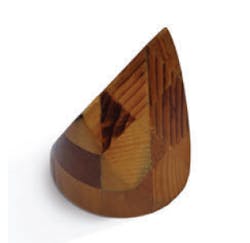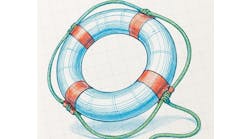I try to imagine what I experienced in the womb. What did I smell, what flavors did I taste, what did I see, how did I interpret sounds, or did I feel cold? Did I understand the role of my parents or the feel of a blanket? I suspect none of that.
We're all born with no understanding of life outside, and we seek to make sense of it with the maturity and wisdom of our infant minds, laying on our back, diapered and watching the animate objects around us change our comfort. Of course, we have many confusions and develop many incorrect understandings. But, by the age of two years, I'm told, the child’s world view is substantially set. The child has developed an understanding of the universe and his or her role in it, or more accurately, how to control the universe to acquire what her or she wants and eliminate discomfort. Some learn the secret to control is obsequiousness, others aggression, or whining, or persistence. Whatever the understanding, it was self-learned with the wisdom of a toddler. I also understand that as we grow, we use affirmational data to strengthen our conviction, and reject any data that might be counter to it. So, personality, modus operandi, our individual “way” is substantially developed by our two-year-old selves.
Made in my woodshop, this object fits a round hole, a square hole, and a triangular hole. If it can, you can.
The wonder years of early childhood are fascinating, and a joy to watch. Of course, by the age of seven we have attained perfection. Once told that there is a number higher than 99—100—the child knows that fact as if he always did, and is insulted if you try to remind him. And, the child who figures that she can keep accumulating numbers up to 999 is likely to inform the adult (who might not have figured it out), “The largest number is 999.” The same child will not get lost in the woods, because he knows where the house is. He will follow adventure after adventure deeper into the woods and become hopelessly lost. Then, as soon as the adult leads him in the right direction, he will claim to have simultaneously figured it out, and angrily says, “I know that. You don’t have to keep telling me.”
Somehow, the aspect of positive parenting, of congratulating children each time they think or accomplishes something on their own, makes them want to do things independently to keep getting that affirmation. Often, their reach exceeds grasp. The realization is somewhat devastating to the child’s self-perception and creates discomfort, which leads to the two-year-old’s learned behavior. Perhaps a lash-out or a sulking or…
The custodial adult needs to accept the needs that drive the style of those in early childhood, affirming their wonder, joy of activity, creativity, and development, but also gently helping them to understand their limits. Children need their internal drivers to be active to explore, to acquire, and help them move to the next stage. It is not wrong or right; it is the necessary path to becoming.
As we grow, we go through several awakening stages. Some are related to early childhood societal-promoted fantasy, manners, human history, team play, freedom and responsibility, girl-boy relations, etc. It's part of the maturing process. And, by the age of 21, we have substantially softened. Yay!
However, the relationship of the individual to the universe as set by the age of two is substantially retained.
[pullquote]
With degree in hand, having proven competency through years of school preparation, the new employee is ready to show off those technical skills and attack industrial problems—with the naivety of context and adventure-driven, self-affirmation needs characteristic of the seven-year-old in the woods, which were decided by the two-year-old mind. Often, the first two years of employment results in another awakening stage and continued maturity in understanding the context of life. For me, this 25-ish experience was as traumatic an awakening as any other secret about life that I learned in second or seventh grade. As a new engineer, I was driven to show off my skill and ability to contribute, and to affirm my self-image. I needed all of my ideas to be accepted as great, and suspect that I wasted time and resources trying to defend my self-image in my two-year-old choices.
When it was labeled as lack of maturity, I was insulted. From my view, I was an adult. When trying to prove your worth, inadequacies will be revealed, which can be a substantial affront to the persona. We need to temper the child’s persona within us, and acquire next-level behaviors.
It seems that becoming what you can become doesn’t stop. As I raised children, I came to a new understanding and appreciation of what my parents did. As I began to supervise others at work, I gained understanding about the system legalities and constraints, and the ambitious striving of others within management. As I coached engineers and youth in gymnastics, I came to understand diverse aspects of individual motivation and developing productive teams. For me, about age 38 brought another substantial jump in maturity. Although continued technical skill development is important, probably more important is the non-technical growth. It's not one step to the finish. It's a continual series of awakenings.
I had a dream that explained it to me. In the dream, I was headed home after work, and got in my convertible sports car with the top down. When I started backing out of the parking spot, the car, on its own, took off, fast and swerving backward down the lanes, scaring me. I frantically worked to stop the car with both feet on the brakes and moving the gearshift to neutral. Finally, it stopped. Gingerly, I put it in first gear and eased off of the clutch, but again, it took off on its own, accelerating dangerously, weaving here and there, and nearly crashing into a gate. It woke me. The car, of course, represented life. Life was driving me, not me driving life. My needs to defend my desired self-image were in charge of me.
I realized that I can be in charge of my life. I am responsible for my perspectives and my developing behavior.
Fast forward to now. I watch friends disappear, and am much more aware of health, legal procedures with estate transfer, and finances than I was earlier. I reconsider how I viewed my grandparents when I was in an earlier stage of understanding. A fine-tuning of my view of life has happened again. “What is next?” I guess I’ll find out when I’m ready.
In all, each stage of life is a joy. At each stage one can treasure the excitement of the success with new experiences. Both the individual and those observing can enjoy it. Each stage provides important insight. As well, in each stage we need to recognize that behaviors, modus operandi, and world views are the result of the understanding that was developed by the inexperienced me, which came many years back. We need to accept the uncomfortable data that contradicts our comfort. We need to know that there is a next stage of maturity. We need to seek it. Become what you can become. Develop your potential.






